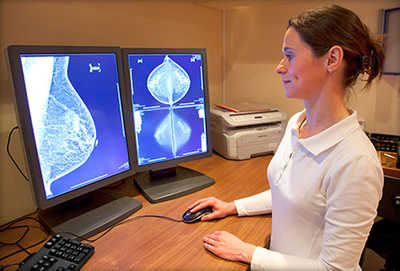An aggressive type of cancer surgery that's grown increasingly popular – and controversial – during the last decade is largely determined by patient preference, and not necessarily by sound medical reasoning.
However, a new study reveals that that crucial decision – whether a woman should undergo a double mastectomy when only one breast is affected – is heavily influenced by her surgeon's recommendation.
That significant finding, published today in JAMA Surgery, was announced by doctors at the University of Michigan, who analyzed the decision-making process relating to the procedure, called contralateral prophylactic mastectomy, or CPM.
For surgeons "who most favored initial breast conservation and were most reluctant to perform CPM," only 4% of patients had the surgery, according to the study's findings. Meanwhile, the "estimated rate of CPM was 34% for surgeons who least favored initial breast conservation and were least reluctant to perform CPM."
"That difference is huge," states Dr. Steven J. Katz, M.D., MPH, professor of medicine at U of M, and the study's senior author. "Even for a procedure that is very patient-driven, we see that surgeons account for a lot of the variability in the community and those surgeon attitudes really matter in terms of whether a patient does or does not get CPM."
Fear of cancer spreading is one of the primary motivations for women with one affected breast to preemptively remove the other at the same time. CPM "for the treatment of breast cancer has increased markedly over the last decade," the study says. It gained widespread visibility two years ago when Angelina Jolie had it done, in addition to other preemptive procedures, to get ahead of any chance of her cancer spreading.
But the actress's decision was supported by sound reasoning. As my colleague Dr. Lila Abassi wrote in December 2015, "she carries the BRCA mutation, which predisposes women toward developing breast and ovarian cancer. In Ms. Jolie's case, her mother died of breast cancer and she has had other family members succumb to the disease. Her reason was valid."
 However, for "most women with early stage breast cancer in one breast, removing the unaffected breast does not improve survival," as noted by the university. Moreover, as Dr. Monica Morrow, one of the study's authors and head of the breast surgery service at Memorial Sloan Kettering Cancer Center in New York points out, "more extensive treatment than is needed equals more harm and more side effects."
However, for "most women with early stage breast cancer in one breast, removing the unaffected breast does not improve survival," as noted by the university. Moreover, as Dr. Monica Morrow, one of the study's authors and head of the breast surgery service at Memorial Sloan Kettering Cancer Center in New York points out, "more extensive treatment than is needed equals more harm and more side effects."
For this study, a population-based survey was conducted that ultimately included 5,080 women (70% of the 7,810 women identified) with stages 0 to II breast cancer treated between 2013-15. The surveys were distributed roughly two months after the patient's surgery. "Surveys were also sent to 488 attending surgeons identified by the patients," the study says, with 377 (or 77%) responding.




